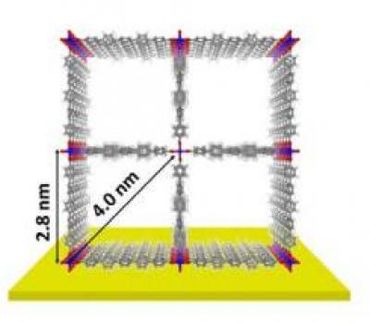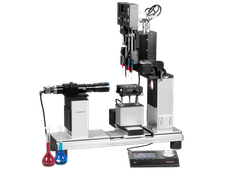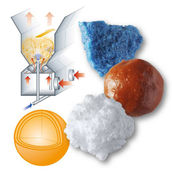Award for a brilliant copper trick
Polish-American polymer scientist Krzysztof Matyjaszewski receives the €10,000 Gutenberg Lecture Award of the Graduate School of Materials Science in Mainz (MAINZ)
Advertisement
The 2010 Gutenberg Lecture Award was today bestowed upon the Polish-American scientist Professor Dr Krzysztof Matyjaszewski for his ground-breaking developments in polymer production and processing. Matyjaszewski is one of the world’s most highly regarded chemists. He both teaches and pursues research at the Carnegie Mellon University in Pittsburgh, USA. The Gutenberg Lecture Award, worth a total of € 10,000, has been conferred on Matyjaszewski primarily because of his development of a new process for the synthesis of polymers, allowing synthetic materials to be tailor-made for specific uses. Matyjaszewski was able to control a large number of hitherto uncontrolled polymerizations by using copper catalyst systems. The resultant materials have a vast range of applications - as surface finishes and adhesives, in printing dyes and cosmetics, and they are even employed in the fields of medicine and pharmacy, being used, for example, as coatings for stents. "Professor Matyjaszewski's process has not only revolutionized polymer synthesis but has had considerable influence on other fields of research. One consequence is that he has become one of the most frequently cited chemists," explains Professor Claudia Felser, Director of the Graduate School of Excellence MAINZ - Materials Science in Mainz, which awards the prize annually.
Krzysztof Matyjaszewski immigrated to the USA in 1985 where he developed his "Atom Transfer Radical Polymerization" process (ATRP) in the early 1990s contemporaneously with the parallel breakthroughs made by the Japanese researcher Mitsuo Sawamoto. The ATRP process is a method of controlled radical polymerization which by means of mostly copper-based reagents allows a high level of control in the assembly of single components. Thus, the build-up of the resulting synthetic molecules can be accurately fine-tuned. Using ATRP, polymers can be constructed that are superior to those that have been available to date in terms of properties, potential range of applications and capabilities. It has now even become possible to create surfaces with an antibacterial potential and these play an important role in certain areas, such as medicine (prosthetics) and the packaging industry. Today hundreds of chemists worldwide work with the Matyjaszewski’s method. His work and discoveries have not only stimulated further academic research, but have also opened up new horizons for the industry.
Krzysztof Matyjaszewski obtained a degree in chemistry at the Technical University of Moscow in 1972 and was awarded his PhD by the Polish Academy of Sciences in 1976. He has been based at Carnegie Mellon University in Pittsburgh, USA, since 1985, where he now heads the Center for Macromolecular Engineering. His consortium is responsible for over 600 publications listed in the Web of Science and there are more than 34,000 entries for these in the citation index. His body of publications currently makes him one of the three most frequently cited polymer chemists in the world. There are also nearly 80 patents that bear his name. Matyjaszewski holds honorary doctorates conferred by universities in France, Russia, Poland, Greece, and Belgium, and he is a member of the Polish Academy of Sciences. He received the Foundation of Polish Science Award, Poland's most prestigious science award, in 2004, and the Presidential Green Chemistry Challenge Award of the US Environmental Protection Agency EPA in 2009. He had previously received the Humboldt Award for Senior U.S. Scientists in 1999, had been appointed to the Elf Chair of the French Academy of Sciences in 1998, and won the U.S. Presidential Young Investigator Award in 1989.
Matyjaszewski has an established cordial relationship with Mainz, having already participated in several academic projects here. He is also closely involved with polymer research workgroups at Mainz University and the Max Planck Institute for Polymer Research, where he has been a member of the Scientific Advisory Board since 2009. Prof. Gerhard Wegner, in his encomium on the prize winner, stated that "The conferring of the 2010 Gutenberg Lecture Award on Professor Matyjaszewski will help strengthen and extend the links between materials scientists associated with the Graduate School of Materials Science in Mainz and this pre-eminent and gifted scientist who is internationally renowned and extraordinarily influential."
Other news from the department research and development
These products might interest you
Most read news
More news from our other portals
See the theme worlds for related content
Topic world Synthesis
Chemical synthesis is at the heart of modern chemistry and enables the targeted production of molecules with specific properties. By combining starting materials in defined reaction conditions, chemists can create a wide range of compounds, from simple molecules to complex active ingredients.

Topic world Synthesis
Chemical synthesis is at the heart of modern chemistry and enables the targeted production of molecules with specific properties. By combining starting materials in defined reaction conditions, chemists can create a wide range of compounds, from simple molecules to complex active ingredients.


































































